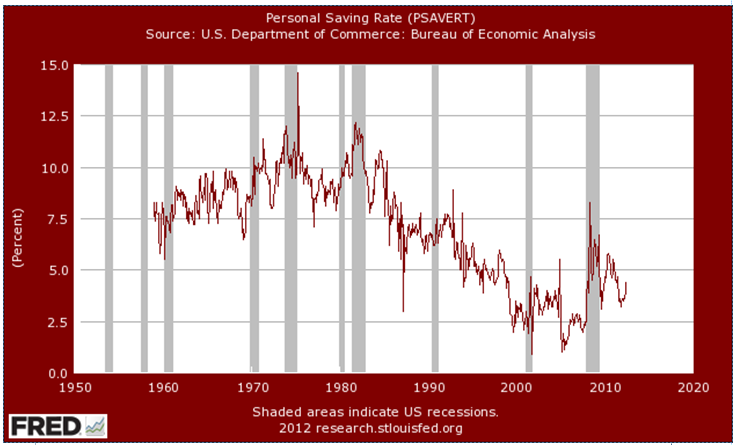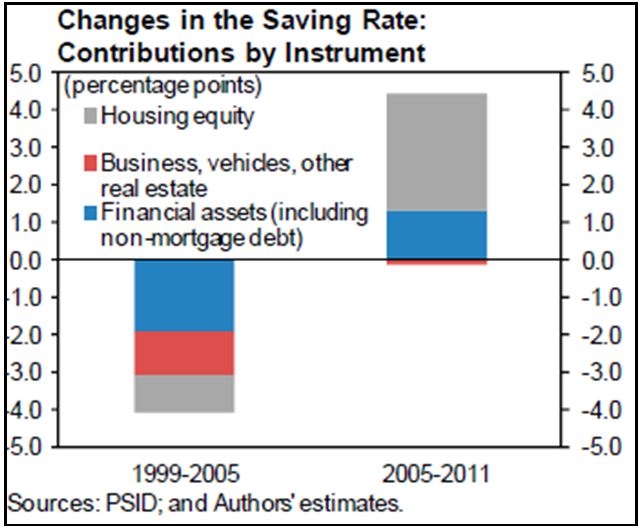 Invest Intelligence When It Realy Matters
Invest Intelligence When It Realy Matters
Household Savings, Consumer Spending and Bankers
Economists, analysts, policy makers and of course central bankers are always paying attention to the household savings rate data for a variety of reasons. Regardless of the reason for their interest, the end result is the same. Bankers want to do all they can to discourage savings so that consumers will load up on credit, thereby holding them hostage to interest payments.
As you can imagine, bankers are able to get laws passed that punish those who save and reward those who spend and borrow money. At the end of the day, only the banks win. To convince Washington that this scheme is beneficial to the economy, bankers insist that an economy that is leveraged will experience more growth, which will lead to more jobs and better living standards. Again this is a myth. Only the banks and corporations benefit from this scheme.
As shown in the accompanying charts, the household savings rate in the U.S. was once healthy. But this was during the 1970s and early-1980s, when the consumer credit markets were in their infancy. When consumer credit expanded during the Reagan administration, Americans began to save less and spend more.
Much of this irresponsible behavior accounted for the economic boom and “Great Bull Market” of the 1990s. But this same behavior facilitated the two largest stock market busts in U.S. history.
Market” of the 1990s. But this same behavior facilitated the two largest stock market busts in U.S. history.
Throughout the post-crisis period, establishment economists have been insisting on the need for consumers to spend more. But consumers have saved their money with good reason. The employment scene remains weak, real wage growth is absent, job security remains fragile, employee benefits continue to be cut, and the price of basic necessities continues to rise much faster than the inflation rate.
As the economy continues to weaken, the household savings rate is likely to mount at least an intermediate-term uptrend, as consumers become more worried about job security.
Washington has been told by economists that the key to economic recovery is for the housing market to recover. This of course is complete nonsense. The only thing that matters are jobs; plenty of them; jobs offering good benefits and wage increases that at least keep pace with inflation; not inflation as reported by Washington, but inflation seen in basic necessities.

Without job growth and wage increases, consumers will have less disposable income. As a result, they will either accumulate debt or they will stop spending. The former scenario will only lead to another disaster down the road, while the latter will result in more immediate problems. Somewhere in between is the right balance.
 Only in an economy driven by debt would you hear that the key to an economic recovery is for housing to recover. If you do not have a job, stable job, you will not be able to afford housing.
Only in an economy driven by debt would you hear that the key to an economic recovery is for housing to recover. If you do not have a job, stable job, you will not be able to afford housing.
For many years banks extended credit to individuals who would not be able to pay it back. But the banks didn’t worry about that. They made fees off of irresponsible loans then flipped them to other financial institutions, claiming the debtors had passed stringent guidelines.
This continues to remain the prime strategy of those who make the decisions in the U.S. because the fact is that the job picture will continue its downward trend so long as the current trade arrangements remain.
The chart above shows the contribution to the household savings rate over two different periods; the latter stage of the dotcom bubble and post-bubble, and the latter stage of the housing bubble and post-bubble periods.
During the 1999-2005, saving in household’s main home contributed 1 percentage point of.jpg) the 4 percentage point decline in savings. In contrast, during the 2005-2011, savings in household’s main home contributed 3 percentage points of the 4 percentage point increase in savings.
the 4 percentage point decline in savings. In contrast, during the 2005-2011, savings in household’s main home contributed 3 percentage points of the 4 percentage point increase in savings.
This data reaffirms the fact that households borrowed against their homes for consumption (via home equity loans) during the housing boom. When the housing bubble popped, homeowners no longer had this borrowing ability since credit standards were raised and home values plummeted. These trends were detailed in America’s Financial Apocalypse.
If in fact a recovery in housing represents the only means to create an economic recovery, it’s going to take a decade before we see a recovery. Even worse, if the U.S. is to rely on a real recovery, it’s going to consume more than a decade.
The Federal Reserve and Washington are already playing more games to manipulate assets and wealth in order to enrich corporate giants and the banking cartel. The price for this theft will be felt in years to come by the majority of Americans, who only realize how they were defrauded many years after the fact.